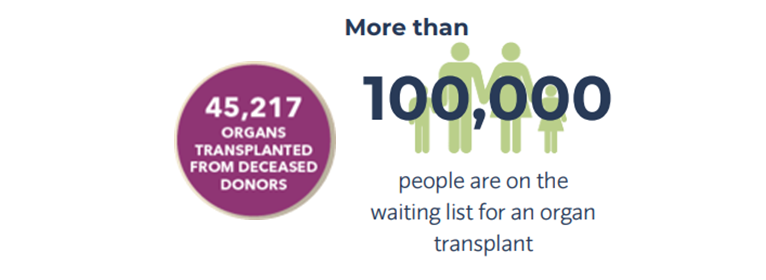Protecting Donor Decisions: The National Importance of the Uniform Anatomical Gift Act (UAGA)
Why Upholding Registered Donations Matters for Patients, Families, and the Integrity of the Donation System
Behind every donor registration is a story of courage, hope, and the desire to save lives. Each year, thousands of Americans make the powerful decision to register as organ, eye, and tissue donors – a decision often made at the DMV or online. Yet this simple act carries profound significance: it is a legally recognized gift which has the potential to save and heal lives.
At the heart of honoring that decision is the Uniform Anatomical Gift Act (UAGA) – a foundational state law adopted across all 50 states to ensure consistency and integrity in the organ donation system. The UAGA affirms an individual’s legal right to decide whether to donate their organs and tissues after death and specifically bans others from overturning this decision.
Why the UAGA Matters
The UAGA establishes the legal framework governing anatomical gifts in the United States. It ensures:
-
-
- A person’s decision to register as a donor is legally binding.
- Next of kin cannot override that decision once it is made.
- The system prioritizes individual autonomy and respect for end-of-life choices.
-

Without the UAGA’s protections, we risk undermining the very foundation of donation, where one person’s act of generosity and selfless choice to save lives is honored without interference.
National Impact of Upholding Registrations
Beyond its legal importance, honoring donor registrations has real and measurable impacts on patients, families, and the broader healthcare system. Every donor registration is a commitment. When this commitment is overturned, it doesn’t just affect one family – it affects every patient on the waiting list. In 2024 alone:
-
-
- Over 100,000 people remained on the national transplant waiting list.
- More than 45,000 organs were transplanted thanks to generous donors.
- Yet, nearly 12,000 donated organs were not used – often due to systemic challenges.
-
When states weaken or ignore the UAGA, it creates confusion, delays, and a chilling effect on public trust in donation. Worse, it leads to lost lifesaving gifts.

The Growing Threat to Donor Rights
Recently, Arkansas enacted a law to amend the state’s Anatomical Gift Act, allowing a patient’s health care power of attorney to overturn a donor’s registered decision and giving next of kin the ability to revoke donation up to two hours after cardiac death.
This sets a dangerous precedent:
-
-
- It disregards the donor’s legally protected decision.
- It places grieving families in agonizing positions.
- It undermines decades of progress in public education and trust in the organ donation system.
-
AOPO and the organ donation community believe strongly: a registered donor’s decision must be honored.
Call to Action: Protect the Gift
Together, as we modernize and improve the organ donation and transplantation system, we cannot lose sight of the ethical core which underpins it – respect for those who say “yes” to donation. This means:
-
-
- Protecting the UAGA in every state.
- Upholding first-person authorization as a legal and moral obligation.
- Educating lawmakers and the public on why these protections matter.
-
The lives of future recipients and the legacies of our donors depend on it.
A Promise Worth Keeping
Organ, eye, and tissue donation begins with a promise that one person’s decision to give will be respected and carried forward with honor. The UAGA helps us keep this promise.
More than 1 million lives have been saved by organ and tissue donors – many from Arkansas – who made the courageous decision to give the gift of life to save others. Our nation’s donation system relies on honoring those decisions.
With over 100,000 Americans awaiting organ transplants, every registered donor matters. Arkansas Act 861 threatens the rights and legacies of more than 1.5 million Arkansans who have registered to donate.
AOPO is committed to defending donor rights and working with lawmakers, families, and our partners to ensure every gift is honored and every life has a chance. AOPO’s concerns raised in a public statement and shared with the Arkansas Senate, are joined by national stakeholders including Donate Life America, the National Kidney Foundation, and the Association for Multicultural Affairs in Transplantation – all of whom opposed this legislation for its potential to undermine trust in the donation process.
Now is the time for every state – and every lawmaker – to stand firmly in defense of donor rights and ensure that every act of generosity is honored, not overturned.
Thank you,
Steve Miller, MBA, CAE
AOPO CEO


